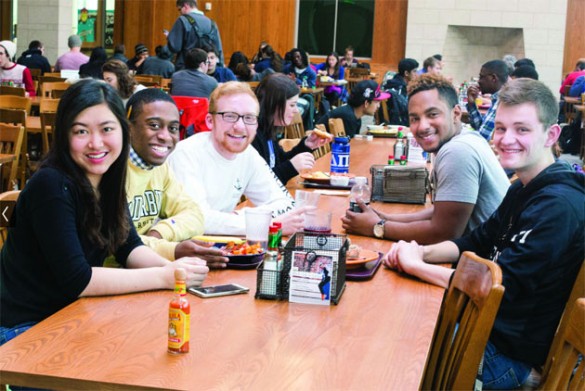
Vanderbilt University Chancellor Nicholas S. Zeppos has announced a set of new investments in the university’s student wellness resources. This includes two prongs: an immediate expansion in staff that have experience and skills working with people of varying racial and cultural backgrounds, and the opening of a new Center for Student Wellbeing.
Two new student wellbeing coordinator positions will be created at the new Center for Student Wellbeing, and a new assistant director for access and inclusion will join the staff of the Psychological and Counseling Center to provide clinical leadership for the execution and growth of culturally sensitive mental health resources for all students.
Vanderbilt plans to open by fall 2016 the new Center for Student Wellbeing, which will be a hub for wellness and prevention resources designed to help students develop and maintain positive mental and physical health practices that lead to enhanced resiliency when encountering difficult situations.
“I have been deeply engaged with our students, faculty and staff throughout the past year to learn how we can best lend support and make Vanderbilt an even greater university. These conversations, which have been candid, productive and telling all at once, revealed that in addition to our current resources, a center devoted to fostering student wellness through an integrative and holistic framework would strengthen our community of care and benefit students who experience distress that may impede academic or personal success,” Zeppos said.
The new center will offer a comprehensive wellness program focused on the following key areas:
- Community – embracing difference and offering encouragement in order to cultivate care and wellbeing;
- Emotional – creating safe spaces in order to encourage insight into emotions, values and identity in a mature and authentic way in order to increase hope and create growth and transformation;
- Intellectual – engaging students in critical thinking and meaningful conversation through programming on timely and relevant wellbeing topics; and
- Mind/Body – enhancing coping skills, self-regulation and resilience through mindfulness, relaxation and exercise.
The center, which will be centrally located near the Zerfoss Student Health Center on campus, will house the current staff members of the Office of Wellness Programs and Alcohol Education as well as the two new student wellbeing coordinators. Associate Dean of Community Standards and Student Support G.L. Black will have oversight of the center, and Rachel Eskridge will serve as the center’s director.
“Housing all wellness staff members in one dedicated space will provide a cohesive one-stop shop for program development and collaboration. Our programs and services will promote and educate students about self-care and care for others as well as providing them with opportunities to learn about and practice the skills foundational to academic success,” Associate Provost and Dean of Students Mark Bandas said.
The assistant director for access and inclusion and the staff of the new center will work closely with other departments within the Office of the Dean of Students, including Residential Education, the Bishop Joseph Johnson Black Cultural Center, International Student and Scholar Services, and the Office of Inclusion Initiatives and Cultural Competence, in the design and provision of on- and off-site culturally sensitive preventive and educational programs. Other planned activities offered by the center include psychoeducation, outreach, workshops, alcohol and drug assessments, and individual supportive counseling, as needed. In addition, Vanderbilt Recovery Support (VRS) will use the space for recovery meetings and to house the Vanderbilt Recovery Lounge space for students to use for studying and community building.